- Getting around Lijiang. Dont stay in the Old Towns more than 2 days, there is nothing to do. KRISS Oct 9, 2013 05:46
- 2013 Beijing Temple Fair BENNYLAU Feb 26, 2013 03:29
- Malaysian traveling from KUL - LAX vis Shanghai PVG ZATI_DY Jan 3, 2013 20:15
More than just a Big Bright Mountain
- Views: 6199
- |Vote: 0 0
- |Add to Favorites
- |Recommend to Friends
Seeking out the quiet places...
The newish highway that runs from Hangzhou to Huangshan (actually in Anhui Povince) gets special emphasis on maps of Zhejiang Province. It’s a busy route: busy trafficking troupes of foreign and domestic tourists in their luxurious coaches from “Heaven on Earth” Hangzhou to the spectacular Yellow Mountain.
Nothing wrong with that, I’ve lived in Zhejiang for over a year now and have been delighted by Hangzhou and want desperately to see Yellow Mountain too. A couple of things put me off. First is the rather steep entrance fee and second is the sheer volume of people that you’re likely to encounter there on any given day.
I’m naturally inclined to seek out quiet places where Mother Nature has worked her magic, in the hope that I’ll discover a measure of silence and isolation that life in China rarely allows. True to form though, mountains in China, particularly the oft-cited famous five (i), are as peopled as the city streets and it can be difficult to appreciate the experience when you’re nose to tail with hundreds of others.
There are two remedies for this eventuality. The first is to visit mountains in the off-peak (pardon the pun) seasons, usually winter, but there is the chance of little accommodation, closed restaurants, difficult access and temperamental weather. The second is to visit different mountains, those that don’t make the foreign guidebooks and magazines, those that lie off the handsome highway and down some dug-up side road somewhere.
Such mountains as these, you’ll find, are not without their ubiquitous flag-toting, matching-hat wearing tour groups, but there are certainly less of them. The chances for time alone with the mountain increase significantly and there’s far more opportunity for listening to that timeless song of rock, tree, water and sky that every mountain sings.
Names and promises...
Travel in China for a while and you’ll note one, of many, recurring names: daming. Daming, 大明, literally means big bright, and finds its way into many a scenic attraction’s name, especially mountains and lakes. Turn off the highway somewhere before you reach Huangshan (Yellow Mountain) and you’ll find a lesser-known set of peaks named Damingshan (Big Bright Mountain) that it might just be worth a day of your time to explore.
Damingshan, as with many other less-frequented sites, makes it difficult for the independent traveller to get to it. The closest bus still only takes me within 40 kilometres of the mountain itself and when the taxi driver I ask tells me there’s still so far to go I think he’s joking. The small town of Changhua unhelpfully runs only one bus a day to and from the mountain and so taxi, or minivan (literally bread ban, 面包车) are my only option.
The minivan is much cheaper and myself along with seven other Chinese passengers (on a trip from Shandong) tumble in. The driver is effusive and the journey passes in a jovial bustle of Mandarin. On arrival he gives us his number and promises, despite my protestations, to wait for me to return and take us all back into town.
Entering the mountain...
Damingshan has not escaped the theme-park entrance that most Chinese mountains have in common. The souvenir, hot food and cold drink sellers form an orderly row calling to me as I make my way to the ticket office. Then I’m through the turnstile and waved onto the waiting coach where I plonk myself at the front for better views. It’s a 20 minute drive, at pace, along a real snake of a road that loops itself up to the start of the “climb”.
Climbing is a misnomer of course. Damingshan has the requisite concrete steps that make it a Sunday-afternoon-stroll kind of a climb where the female climber can wear her high heels and the male climber his best suit. A group of Korean’s pass me in their shiny North Face gear, oversized packs and climbing poles in hand. I feel under-dressed, but the truth is that this climb requires nothing more than a sturdy pair of boots and clothes appropriate to the season.
A place for poetry...
This late October day I feel like I’ve timed it just right. The deciduous trees seem to have spent the whole year getting ready for today and parade the mountain, undermining the more populous pines, with their rich costumes of gold, pink, orange and red. It’s the maples that steal the show though with their five-fingered leaves in vermilion.
The path makes a steady, upwards climb through interesting terrain. Great boulders, some many times human height, consistently channel chuckling streams ever downwards. Sometimes the stream, on reaching a flat, will stretch into a clear pool, a window through which a thousand pebbles can be seen and the perfect place for poetry. Ming Emperor Zhu Yuanzhang left these words:
“Heaven is my tent and land is my blanket,
stars and moon accompany me when I sleep.
I dare not stretch my legs at night
for fear that I might break this land.” (ii)
10 kilometres of caves...
Damingshan in a day makes for a relaxed climb with plenty of time to stop and take photographs or simply absorb the scenery. A good way up the mountain and I arrive at a small cave entrance that marks a somewhat down-trodden opening to one of Damingshan’s unique features. A 10km network of caves that in summer provide a much needed place to escape from the heat and in winter are spiked with icicles.
This late autumn day and the caves are damp, chilly and unwelcoming. Nevertheless I’m compelled to explore and follow the dripping walls and low ceilings where they may lead. Only a small section of the caves is “open” for visitors, but off the concrete path lie long dark tunnels, their boulder-strewn floors spotted with occasional shafts of light.
Most interesting is when the tunnels exit the mountain. The low ceilings suddenly vanish upwards to leave me looking at a great tear through the mountain itself, light zigzags its way down from some unseen source. From inside the cave, looking out through the mouth, I am rewarded with amazing views of the ragged surrounding peaks.
A modest summit...
Climbing a little higher and I finally reach a swing bridge that stretches between two peaks and leads to the highest point that I can get to. The bridge is reminiscent of many an adventure movie and feels precarious with its wooden planks and swinging gait. It’s fun to cross for those who aren’t afraid of heights and leads to a peak of rocks and shrubs. I’m at the top, which is pretty small and would feel crowded were 20 other people there. Luckily enough, I’m alone.
This isn’t a “major” mountain by any means. Its highest peak is just shy of 1500 metres, yet there’s a certain pleasure in having made it here. The view is impressive and said to be similar to that at Yellow Mountain, with a host of bold peaks carelessly snagging the sky. Their summits are rocky and narrow as knife blades and pine trees poise with kamikaze abandon upon their edges. I’m certain when the sky is clear the view must be magnificent, but as it is I can only see the outline of the more distant peaks through the murky sky.
66 hectares of grass...
Damingshan has one more surprise however, that you might miss if you don’t know it’s there. Before crossing the bridge over to the final peak, take a small and barely signposted path that leads along the edge of the mountain and you will come to a few small huts. This is the entrance to 66 hectares of grassland; a vast valley smuggled in between the peaks. Originally it was free to enter but the current tenants (for it is rented) charge a small fee to enter. Is it worth it ?
I guess it depends if you like grass. For me it’s worth it just to be walking through a mountain-top grassland. Again I feel I’m lucky with the season, the grass having turned a pale gold and its fluffy seed heads, taller than me, dance in waves with the breeze. A couple of dirt paths thread through the grass and I meet one of the tenants who leads me to a fork in the road and points me along the smaller path. He tells me at the end lies a small hut that marks the spot where Zhu Yuanzhong, prior to becoming emperor, addressed his hidden army. It feels isolated and remote, hemmed in by the surrounding mountains and I can well imagine this band of rebellious fighters camped out here in secret.
It’s getting to be late afternoon, the sky is darkening and the temperature is dropping. I stop at a tiny make-shift tea house for a warming cup of green tea picked from the mountain. The owner and I chat for a while. She tells me that she wants to renovate the house, but she still doesn’t have enough money: it’s expensive to haul bags of cement up the mountain. I suddenly don’t begrudge the money for the tea. She tells me it will snow in the next few weeks, and that the grassland is then at its most beautiful.
Cable cars and kept promises...
At close to 5pm, the lady tells me it’s time for me to go or I’ll miss the last bus down. The last bus, I hadn’t even thought about it. She advises me to take the cable-car or I’ll be too late, so I do. I make my way through the caves again following the sign-posts to the cable-car station and there isn’t another person to be seen. I seem to be blessed with traveller’s luck and get off the cable-car at the bottom to be hurried onto the last bus of the day. The stallholders are closing down their shops and I join them for the drive down the long and winding road back. I wonder briefly what would have happened had I arrived a few minutes later ?
At the bottom of the mountain, the near frantic bread-van man is acting as though my return is a miracle. When he finally calms down and we fill up the van with other latecomers, I manage to understand his story. The group of Shandong travellers had exited the mountain some hours earlier and had argued with the driver at some length, not wanting to wait for me. They’d even offered him extra money to take them and leave me behind but he refused.
I am blessed again. I thank the driver for his kindness and for keeping his promise. I remain genuinely moved by his conduct towards me. As Damingshan disappears behind me into the quickly closing evening, I relax, only half-listening to the driver’s boundless chatter that requires no answers. It’s fanciful, I admit, but I believe every mountain has its own character: Damingsham is dramatic, cool and secretive. With its grassland, caves and autumnal colours I feel it deserves a less common name, a title more unique, it being so much more than just a big, bright mountain.
Traveller’s Information (October 2007)
English: Big Bright Mountain
Pinyin: dàmíngshān
Mandarin: 大明山
Entrance Fee: 98 RMB per person (including 10RMB for bus ride to and from)
Grassland Fee: 10RMB per person
Cable-Car: 25RMB per person, one-way
Getting There:
For those not wishing to take a tour, DIY travel is not easy, but here goes.
From: Hangzhou West Bus Station [杭州汽车西站]
To: Lin’an [临安]
Cost: 10 RMB
Time: 1 hour (buses leave regularly, every 15 minutes or so)
From: Lin’an
To: Changhua [昌化]
Cost: 11 RMB
Time: 2 hours
From: Changhua
To: Damingshan
Cost: 15 RMB per person, one way, in a bread-van
Time: 1 hour
There is a website, but it is all in Mandarin Chinese: www.damingshan.com
Notes for the review:
(i) Taishan|泰山;Hengshan|衡山;Huangshan|黄山; Huashan|华山; Songshan|嵩山
(ii)Emperor Zhu Yuanzhang|朱元璋 wrote this poem on a rock that he used to rest at often. The rock is in the form of a person and is called the Rock of Sleeping Zhu|朱眠石. This translation is taken from a sign on the mountain, but I have modified the English a little.



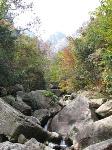
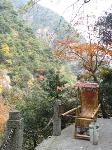
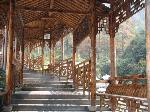
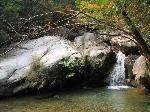
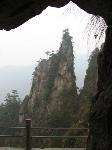
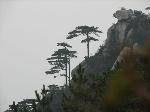
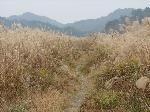
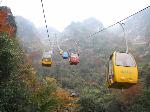
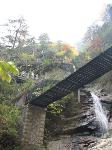
 Copyright © 1998-2025 All rights reserved.
Copyright © 1998-2025 All rights reserved.